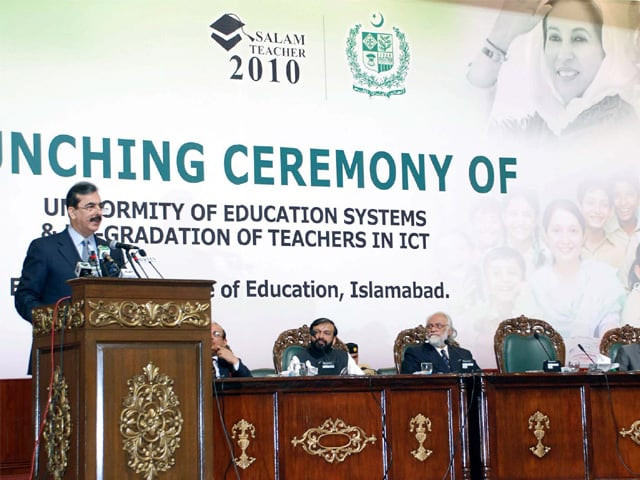NA approves budget amid PML-N walkout

NA approves budget amid PML-N walkout
The budget approval came amid claims by the government that it offers best solutions to the country’s economic troubles. The opposition alleges that the government lacks both vision and direction. However, there were hardly any signs on Friday that the PPP-led coalition is facing any significant challenge from its political opponents.
Though the PML-N abstained from voting on the Finance Bill, its top leader in the National Assembly said the party did not want to see the government get weakened.
The PML-Q backed the budget with one of its key lawmakers announcing support for the government to “strengthen a fragile democracy.”
Prime Minister Yousaf Raza Gilani hailed efforts of his economic managers and members from all parliamentary groups on the approval of the budget, saying that close cooperation among political parties would strengthen democratic traditions.
“When you agree to disagree, democracy is victorious,” Gilani told the House immediately after the approval of the budget.
Opposition Leader Chaudhry Nisar Ali Khan led a token walkout by PML-N lawmakers to protest, what he called “discretionary treatment” of amendments his party legislators proposed to be made to the Finance Bill.
“We are not ready to be part of this budget. We don’t own and will not support it,” Khan said before PML-N lawmakers staged a walkout from the House.
Gilani called the budget “realistic and transparent”. “We wanted to promise only what we can give to our people,” the premier spoke of the announcements in the budget.
Later, the House also approved Rs424 billion supplementary grants for the outgoing fiscal 2009-10. The government also presented in the House details of Rs39.59 billion charged on non-voted expenditures.
Earlier in the day, the government introduced several amendments to the Finance Bill that was presented to the National Assembly on June 5 to incorporate more than 60 recommendations by a Senate committee.
But all amendments proposed by the opposition were rejected by a majority vote.
The steps approved through the bill include one per cent increase in general sales tax (GST), 50 per cent increase in salaries of government employees, imposition of capital gains tax on the sale of shares in stock markets, establishment of inland revenue service and enhancement in the incentives for parliamentarians.
Amendments proposed by the opposition called for consolidation of GST at 12 per cent from the existing 17 per cent, withdrawal of petroleum levy and reduction in proposed increase in incentives for parliamentarians.
The government has transferred to the provinces the right to collect capital value tax on the sale and purchase of immoveable property as envisaged in the 18th constitutional amendment.
In another amendment, different slabs for the imposition of capital gains tax on stocks’ trading were announced.
According to arrangements, 10 per cent tax has been imposed on those deals in which securities are disposed of by buyers within six months.
Keeping them for a period between six months and one year would lead to a 7.5 per cent tax while nothing will be charged if the second transaction takes place after a year.
Presented to the House by Finance Minister Dr Abdul Hafeez Shaikh, the Finance Bill proposed a total outlay of Rs3.259 trillion, showing a gap of Rs685 billion to be financed through foreign and local bank borrowings.
In the budget, the finance minister proposed massive cuts in subsidies, freeze in current expenditure and an Annual Development Plan focused only on completing ongoing projects, still he could balance the books only by proposing taxation measures which certainly looked inflationary.
The total outlay of the next financial year budget is almost 11 per cent more than that of the current fiscal year.
The authorities have estimated total income at Rs2.58 trillion, showing a gap of Rs685 billion between income and expenditures of the federal and provincial governments.
The authorities surrendered to the International Monetary Fund’s condition of restricting the deficit at a reasonable level.
The government has proposed new tax measures of Rs133.3 billion to achieve an over-ambitious target of Rs1.677 trillion set for the Federal Board of Revenue (FBR).
Published in The Express Tribune, June 26th, 2010.



















COMMENTS
Comments are moderated and generally will be posted if they are on-topic and not abusive.
For more information, please see our Comments FAQ